Letter Writing
- This is the art of expressing yourself to someone you know, or you do not know, on a piece of paper.
- In this case, the message being conveyed is received as though you are talking directly to the person you have addressed the letter to.
There are of two types:
1. Informal letters
2. Formal letters
Informal letter
Informal letters are also called personal or friendly letters. They are the kind of letters you would write to your parents, relatives and friends. They are called informal because you can write them in your own way and say what you want in them. You write letters probably to:
- make an apology to a friend
- invite a friend to a party
- wish somebody good luck
- give condolences
- arrange a meeting, a visit or a tour
- ask for a favour
- start an old friendship afresh
- make a pen-pal
- say thank you
- express sympathy
- accept or turn down an invitation
- give some information
- congratulate someone
Writing a letter
When you take up your pen to write a letter, perhaps the first thing you should do is to put down in note form the points you would like to include. You may give a paragraph to each main point. Then you will write the final copy. Finally, read through your letter and make corrections of any mistakes made in punctuation, spelling and grammar. It is important that you stick to your rough plan when writing your letter. Write it simply, directly, politely and correctly.
A friendly letter takes the following form:
- Indented or block style of address can be used.
- It has one address – (the sender’s) at the top right hand side of the letter.
- Does not require reference.
- One can express himself or herself widely unlike in an official letter.
- Signature not necessary at times.
- You can salute by name or relationship for example: Dear Jane, Dear cousin, Dear mother.
Beginning a personal letter: some examples
- This will be a pleasant surprise for you.
- I was very thrilled to read from you after such a long time.
- I was given your address by….. and I decided to write to you to……
- It’s such a long time since I read from you.
- You will be pleased to hear that……
- I was delighted to receive your letter of 5th June.
- I am writing to let you know that I will be visiting you early next month.
- I am happy to inform you that my father has been discharged from the hospital.
- Congratulations on your brilliant success.
- I wonder whether you would spare sometime to come and see us during the weekend beginning May 4th.
Rounding off your letter: some examples
- I do hope that you will enjoy yourself at the Coast.
- I very much look forward to meeting you.
- I know I will enjoy meeting you again.
- I wish you the best of luck in your exams.
- Please give my kindest regards to your parents.
- Please reply as soon as you can.
- Give my love to the children.
- Please accept my deepest sympathy on the death of your……
- Wishing you quick recovery from your illness .
- I am anxiously looking forward to receiving your reply.
Ending of a friendly letter
You may close your letters in one of the following ways, depending on the person you are writing to:
Sincerely yours; Your loving daughter; Yours sincerely; Yours cordially; Affectionately yours; Yours ever; Your son; Lovingly yours.
You may also end your letter with a very short statement such as:
Best wishes; My warmest regards; Cheerio; My fondest regards; Happy New Year; Best of luck; Say Hello to Mike; My kindest regards;
Address on the envelope
This should be written neatly and boldly. In most cases you will use titles such as Mr, Miss,Mrs, Dr, Rev, and Prof before the addressee’s name:
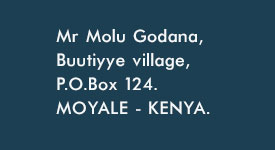
Quite often, you will use at least two initials before someone’s name:
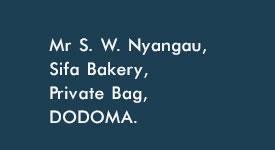
When you are writing to a boy the title of Mr is not necessary.
Example of an informal letter
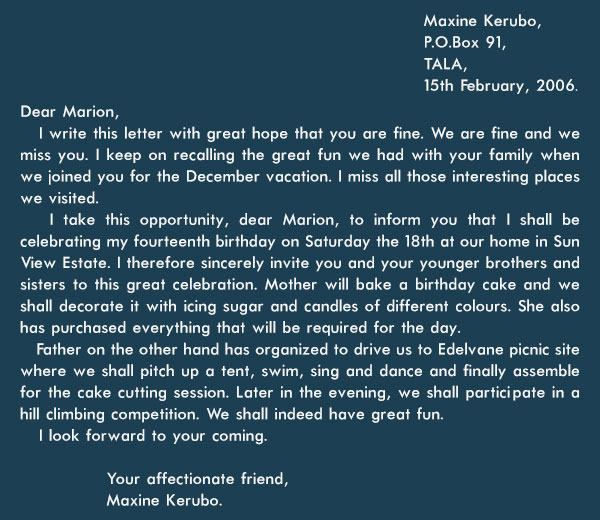
Formal letter
Formal letter is also known as a business or official letter. Most formal letters have serious, clear and direct points. Such letters are generally short and contain only necessary information. Formal and business letters are addressed to organizations, companies, government offices and to people who hold important positions.
A formal letter can take any of the following form:
- A letter of apology written by a student or pupil to a headteacher.
- A letter applying for a course of study in a college.
- A letter applying for a job in a firm or company.
- A letter of resignation written by an employee to an employer.
- A letter from a farmer requesting for tenders.
- A letter to a games captain in a given school requesting for a friendly match.
- A letter of complaint for example to the Municipal Council.
The plan of a formal letter.
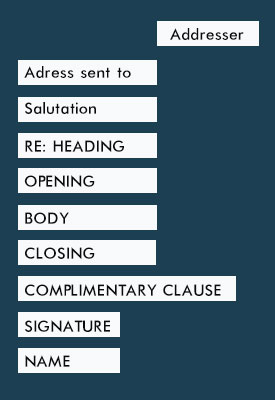
The face of a formal letter
A formal letter is written following various rules. Addresses included should be two – at the right hand corner of the page appears the writer’s address. The receivers address appears on the left hand side closer to the margin as illustrated below:
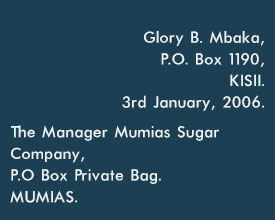
Types of addresses
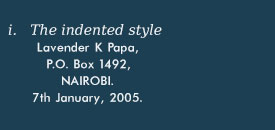
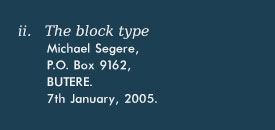
The salutation
Refers to the greetings which introduce the body of the letter. In official letter writing people are saluted differently.
Example:
To the managers – Dear Sir
To the manageress – Dear Madam
To business companies – Dear Sir/ Madam
The reference
Reference in the formal letter is written below the salutation. It is a sentence topic of the whole body of the letter. It gives a general idea of what the letter is all about.
Example:
RE: EDUCATIONAL FIELD TRIP
The body
The body of a letter is divided into three parts:
- The introduction
- The aim
- The ending
The complementary clause
Also known as an honourable ending
- Yours faithful
- Yours respectful
- Yours sincerely
The signature
Should be indicated before the writer’s name. The writer should sign it himself or herself.
Example:

Now study the following letters and see how they fit into the plan you have just learnt about.
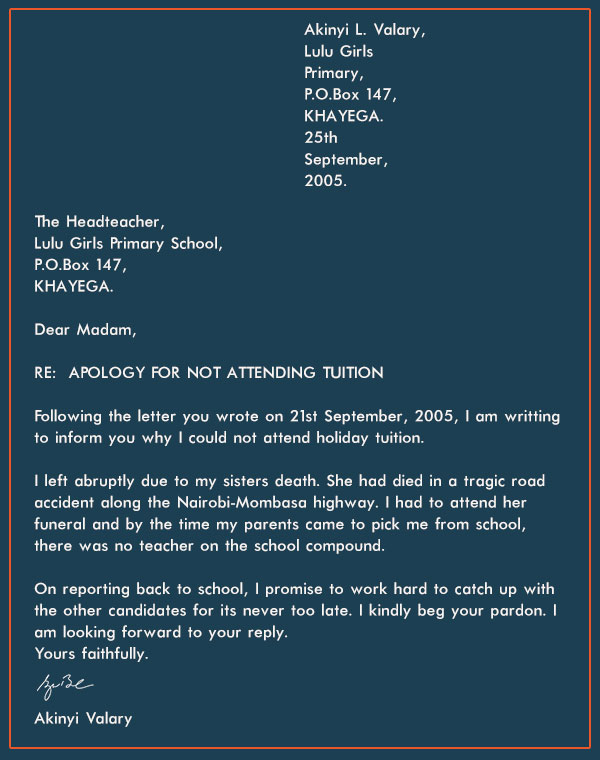
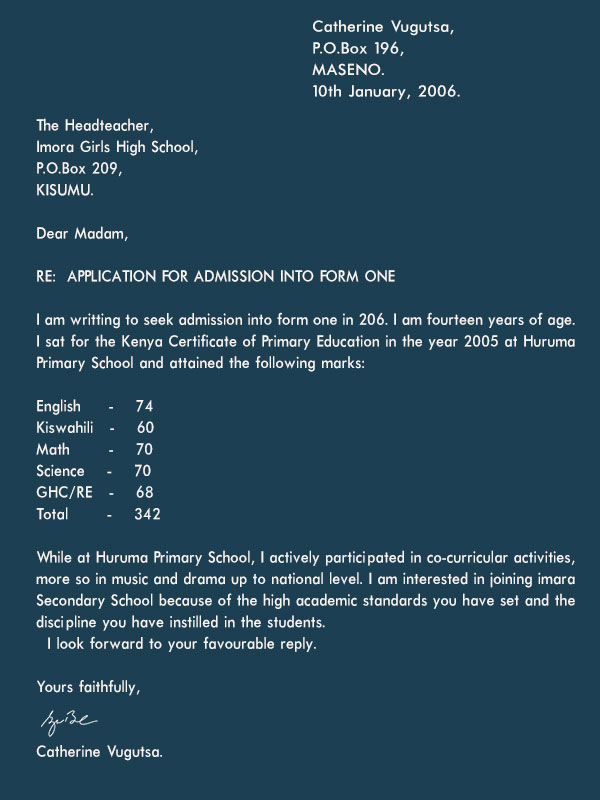
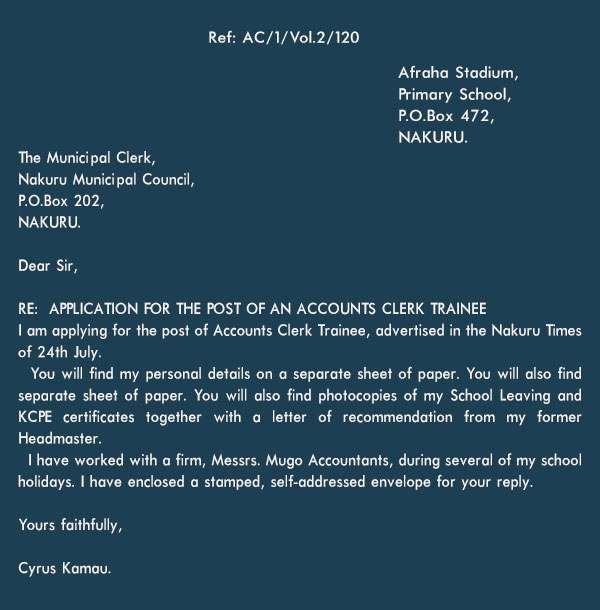
Some useful expressions in formal and business letters
When making enquiries:
- I am writing because I need your help.
- I would be very thankful if you would give me some information.
- Please let me know if …
- I would be happy to know….
When applying for a job:
- I wish to be considered for the post of…
- I am writing in response to the advertisement of… in which…
- I am willing to turn up for an interview if asked to do so.
- I hope you will consider my application and give me a favourable reply.
- I remain hoping for a favourable reply.
- I have always wanted to be a secretary and this seems to be a good opportunity.
- Enclosed please find my School Leaving Certificate.
- The following are the names and addresses of two referees.










